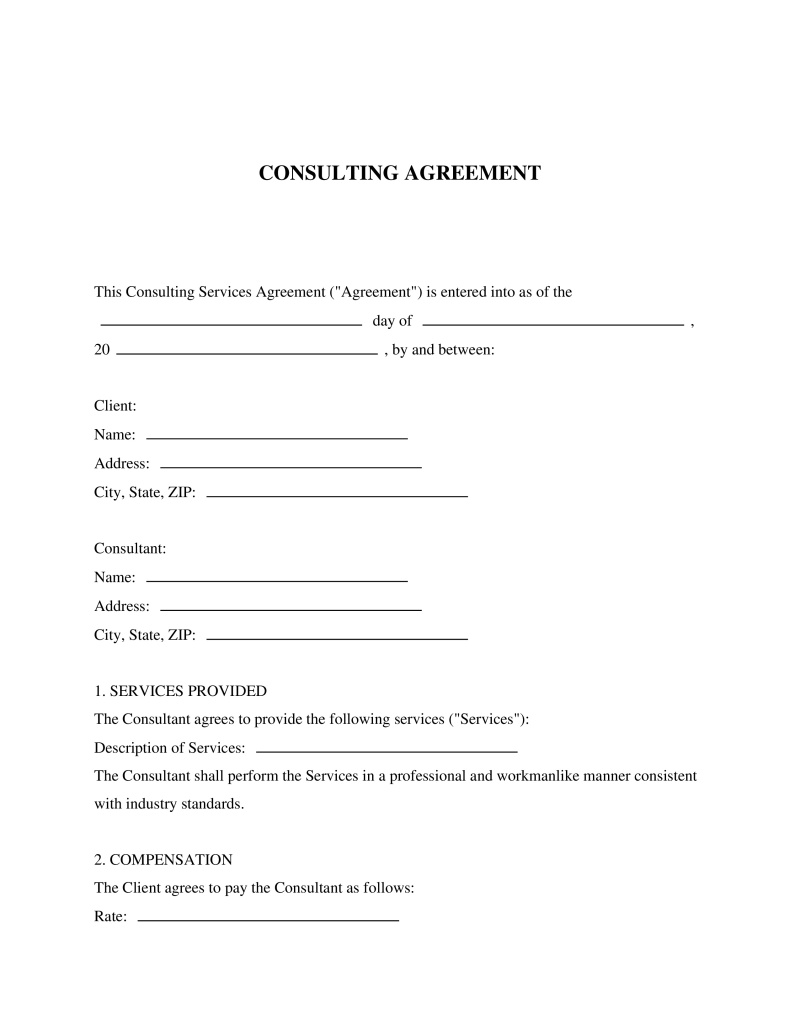A Consulting Agreement outlines the terms between a consultant and a client, defining services, compensation, and confidentiality obligations.
Consultant Name
Type the full name of the Consultant as it appears in official documents, including their first name, middle initial (if any), and last name. For example, "John A. Smith." This name will be used in the legal agreement, so ensure it is accurate to avoid any issues later.

Table of Contents
What is a Consulting Agreement?
A Consulting Agreement is a legally binding document that outlines the terms of a consulting relationship between an expert or consultant and their client. This document serves as a comprehensive framework, detailing the scope of services to be provided, compensation, confidentiality obligations, and other critical terms and conditions. Businesses or individuals seeking specialized knowledge or services benefit from these agreements by clearly defining expectations and responsibilities, thereby mitigating potential disputes. Whether you are a consultant offering your expertise or a business engaging such services, having a well-crafted agreement in place is crucial for ensuring a successful collaboration.
Key Features
Important Provisions
- Definition of Services: Clearly outlines what consulting services will be provided.
- Compensation and Payment Terms: Details how much and when the consultant will be paid.
- Confidentiality Clause: Protects trade secrets and proprietary information exchanged during the consultancy period.
- Termination Clause: Specifies how either party can terminate the agreement before completion of services under certain conditions.
- Dispute Resolution: Outlines methods for resolving any disputes that arise, including mediation or arbitration.
Pros and Cons
Pros
- +Helps in establishing clear expectations and responsibilities, thus reducing the risk of misunderstandings.
- +Protects proprietary information and intellectual property through confidentiality clauses.
- +Facilitates smooth payment processes with defined schedules and amounts.
- +Allows for customization to fit specific needs and scenarios between different parties.
- +Provides legal recourse in case of disputes, safeguarding interests.
Cons
- -May require negotiations that can delay the start of consulting services.
- -Legal jargon within the document could necessitate review by legal professionals, potentially increasing costs.
- -Inflexibility in some pre-defined terms might not suit every unique consulting scenario.
Common Uses
- Engaging an expert to provide strategic business advice.
- Hiring a consultant for specialized training sessions or workshops.
- Contracting out research projects to independent researchers or firms.
- Obtaining temporary project management services during peak periods or for specific projects.
- Leveraging outside expertise for IT systems development or integration.
- Utilizing consultants for marketing strategy formulation and implementation.
Frequently Asked Questions
Do you have a question about a Consulting Agreement?
Example questions:
Not the form you're looking for?
Try our legal document generator to create a custom document
Community Discussion
Share your experience and help others
Legal Notice: Comments are personal opinions and do not constitute legal advice. Always consult a qualified attorney for matters specific to your situation.
Comments (0)
Leave a Comment
No comments yet. Be the first to comment!